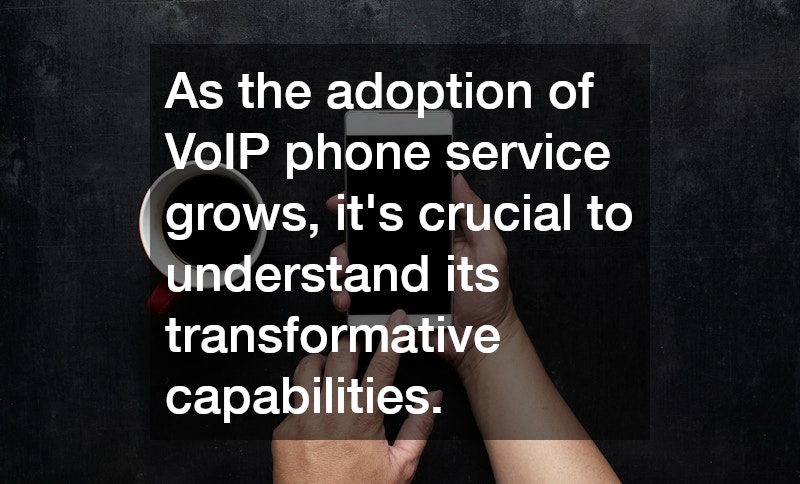In today’s fast-paced digital world, communication has evolved beyond the traditional telephone systems to more innovative and efficient technologies. Among these, Voice over Internet Protocol (VoIP) has emerged as a prominent player, offering individuals and businesses a versatile alternative for making telephone calls over the internet. As the adoption of VoIP phone service grows, it’s crucial to understand its transformative capabilities and the reasons behind its increasing popularity for both personal and business communications.
What is VoIP and How Does It Work?
VoIP, or Voice over Internet Protocol, is a technology that allows users to make voice calls using a broadband internet connection instead of a regular (or analog) phone line. By converting voice signals into digital data packets and transmitting them over the internet, VoIP enables seamless communication with reduced reliance on dedicated telephone networks.
This digital transformation allows for greater flexibility in how voice data is managed and utilized, making it an appealing option for those seeking modern communication solutions.
To set up a VoIP phone system, several components and requirements must be met. Firstly, a high-speed internet connection is essential to ensure clear and uninterrupted calls. Additionally, users need a VoIP-compatible device, such as an IP phone, a computer with a headset, or a traditional phone connected via a VoIP adapter. Finally, a VoIP service provider is required to handle call routing and connectivity, offering users an interface to manage their communications effortlessly.
The process of making a call with VoIP begins with the digitization of voice signals. These signals are then compressed into data packets and sent through different paths across the internet to the recipient. Upon arrival, these packets are reassembled and converted back into audio signals, allowing the recipient to hear the caller’s voice. This method not only ensures efficient use of bandwidth but also opens up possibilities for integrating additional communication features.
Advantages of Using VoIP Over Traditional Phone Lines
One of the most compelling advantages of VoIP services compared to traditional phone lines is the significant cost savings they offer. By leveraging the internet for voice transmission, businesses and individuals can greatly reduce or even eliminate the expenses associated with long-distance and international calls. Moreover, many VoIP providers offer flexible pricing plans and bundled packages that include additional services such as video conferencing and multimedia messaging, further enhancing their value proposition.
VoIP also offers unparalleled flexibility and scalability, making it an attractive choice for both businesses and personal users. Unlike traditional phone systems that require physical lines and extensive hardware, VoIP systems can be easily scaled to accommodate growth or changes in business needs. Users can add or remove lines, enable new features, and configure their systems remotely. This adaptability is especially beneficial for businesses with remote or mobile workforces, allowing employees to stay connected no matter where they are located.
In addition to cost savings and flexibility, VoIP technology fosters enhanced collaboration and communication. Features such as conference calling, real-time video interactions, and multimedia sharing are seamlessly integrated into VoIP platforms. These functionalities not only improve communication efficiency but also bolster team collaboration and productivity. As organizations increasingly adopt hybrid working models, the ability to unify communications in a single platform becomes a major advantage of VoIP services.
Are There Any Drawbacks or Considerations with VoIP?
Despite its many advantages, VoIP technology also comes with potential drawbacks that users should consider. One of the primary concerns is the dependency on a stable internet connection, as the quality of VoIP calls can be significantly impacted by internet speed and bandwidth availability. In areas where internet access is unreliable, users may experience dropped calls, jitter, or poor audio quality, which can be frustrating for both business and personal communications.
Another consideration with VoIP phone services is data security. As voice data is transmitted over the internet, it is susceptible to interception and unauthorized access. To mitigate this risk, users should employ robust security measures such as encryption, secure connections, and regular software updates. Selecting a reputable VoIP provider that prioritizes security and offers features like secure data transmission and fraud prevention can help safeguard sensitive information and maintain communication integrity.
While these challenges may seem significant, they can often be mitigated through strategic planning and the adoption of best practices. Ensuring access to a reliable internet provider and implementing redundancy strategies, such as using mobile data as a backup, can help address connection issues. Additionally, investing in VoIP-compatible networking equipment and optimizing network configurations can enhance call quality and reliability. With careful consideration and proactive measures, users can enjoy the benefits of VoIP while effectively managing its challenges.
Conclusion
As we navigate the evolving landscape of communication technologies, VoIP phone service stands out as a crucial component in facilitating efficient and cost-effective interactions. By transforming voice into digital data, VoIP offers unparalleled advantages such as cost savings, flexibility, and enhanced collaboration. While certain considerations, such as internet dependency and data security, necessitate attention, these challenges can be managed with informed strategies and careful planning. In an increasingly interconnected world, embracing VoIP technology paves the way for seamless and dynamic communication in both personal and business contexts.


